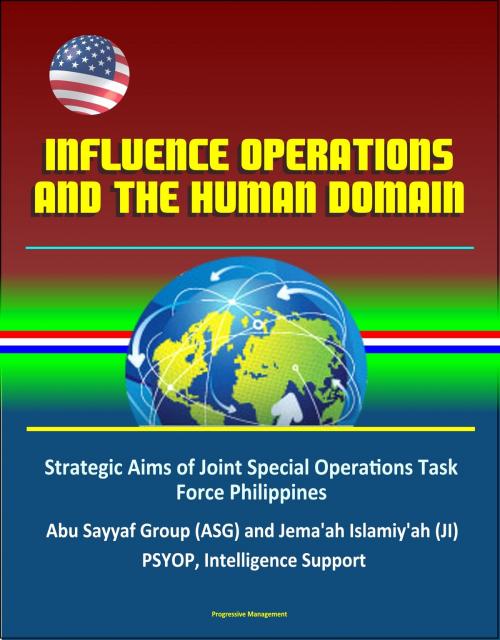Influence Operations and the Human Domain - Strategic Aims of Joint Special Operations Task Force Philippines, Abu Sayyaf Group (ASG) and Jema'ah Islamiy'ah (JI), PSYOP, Intelligence Support
Nonfiction, History, Military, Social & Cultural Studies, Political Science| Author: | Progressive Management | ISBN: | 9781310228735 |
| Publisher: | Progressive Management | Publication: | May 15, 2016 |
| Imprint: | Smashwords Edition | Language: | English |
| Author: | Progressive Management |
| ISBN: | 9781310228735 |
| Publisher: | Progressive Management |
| Publication: | May 15, 2016 |
| Imprint: | Smashwords Edition |
| Language: | English |
Professionally converted for accurate flowing-text e-book format reproduction, this unique case study which addresses a common problem: how to influence the human domain—a local population—as part of a strategic plan. The U.S. Army Special Operations Command strategic document ARSOF 2022 places particular emphasis on the human domain, which is amplified in this case study. As the authors argue, successful influence operations such as those carried out in support of the strategic aims of Joint Special Operations Task Force -Philippines (JSOTF-P) between 2004-2008 can undermine support for an adversary, disrupt their operations and strategies, prevent recruitment and logistical support, and ensure that the adversary does not receive sanctuary and support in the future. Moreover, as new threats from armed groups continue to emerge around the world, there is a strong demand signal for in-depth analysis of successful influence operations from a variety of cases, including JSOTF-P.
The challenge in crafting and implementing effective influence operations that influence this human domain is threefold. The first is how to clearly define influence operations. The argument that Lopacienski and Scanzillo make is that the commonly misrepresented and ambiguous term "Information Operations" does not comprehensively or adequately address the scope of such operations. Instead they propose and clearly define a new joint doctrinal term - Influence Operations. Influence Operations builds on existing joint doctrine and skill sets and does not require expensive new technology or weapons platforms. Instead, the authors argue, it is about adopting a particular mindset and applying core skill sets for which Special Operations Forces such as Army Special Forces, Psychological Operations, Naval Special Warfare, Civil Affairs teams, and Marine Special Operations units are selected for and are trained to achieve.
Chapter I * The Foundations of Influence Operations * A. Definitions and Clarifications * B. The Human Domain: Competing for Attitudes, Perceptions, and a Vocal Majority * Chapter II * Joint Special Operations Task Force - Philippines (JSOTF-P) Method of Engagement * A. Capacity Building * B. Civil-Military Engagement * C. Information Engagement and Psychological Operations * D. PSYOP: A Core SOF Capability * E. Intelligence Support Operations * Chapter III * Influence Operations in Action * A. Together In the Islamic City of Marawi * B. Sulu: Message, Messenger, and Medium * C. After Sulu: Shoring Up Basilan and Zamboanga * Chapter IV * Alternating Effort to Maximize Influence Effects * Chapter V * The Future of Influence Operations * A. Preparing SOF as the Executors of Influence Operations * B. Conclusion * Teaching Questions * Appendix A: Threat Groups in the Philippines * Appendix B: Selected Bibliography * Footnotes
Professionally converted for accurate flowing-text e-book format reproduction, this unique case study which addresses a common problem: how to influence the human domain—a local population—as part of a strategic plan. The U.S. Army Special Operations Command strategic document ARSOF 2022 places particular emphasis on the human domain, which is amplified in this case study. As the authors argue, successful influence operations such as those carried out in support of the strategic aims of Joint Special Operations Task Force -Philippines (JSOTF-P) between 2004-2008 can undermine support for an adversary, disrupt their operations and strategies, prevent recruitment and logistical support, and ensure that the adversary does not receive sanctuary and support in the future. Moreover, as new threats from armed groups continue to emerge around the world, there is a strong demand signal for in-depth analysis of successful influence operations from a variety of cases, including JSOTF-P.
The challenge in crafting and implementing effective influence operations that influence this human domain is threefold. The first is how to clearly define influence operations. The argument that Lopacienski and Scanzillo make is that the commonly misrepresented and ambiguous term "Information Operations" does not comprehensively or adequately address the scope of such operations. Instead they propose and clearly define a new joint doctrinal term - Influence Operations. Influence Operations builds on existing joint doctrine and skill sets and does not require expensive new technology or weapons platforms. Instead, the authors argue, it is about adopting a particular mindset and applying core skill sets for which Special Operations Forces such as Army Special Forces, Psychological Operations, Naval Special Warfare, Civil Affairs teams, and Marine Special Operations units are selected for and are trained to achieve.
Chapter I * The Foundations of Influence Operations * A. Definitions and Clarifications * B. The Human Domain: Competing for Attitudes, Perceptions, and a Vocal Majority * Chapter II * Joint Special Operations Task Force - Philippines (JSOTF-P) Method of Engagement * A. Capacity Building * B. Civil-Military Engagement * C. Information Engagement and Psychological Operations * D. PSYOP: A Core SOF Capability * E. Intelligence Support Operations * Chapter III * Influence Operations in Action * A. Together In the Islamic City of Marawi * B. Sulu: Message, Messenger, and Medium * C. After Sulu: Shoring Up Basilan and Zamboanga * Chapter IV * Alternating Effort to Maximize Influence Effects * Chapter V * The Future of Influence Operations * A. Preparing SOF as the Executors of Influence Operations * B. Conclusion * Teaching Questions * Appendix A: Threat Groups in the Philippines * Appendix B: Selected Bibliography * Footnotes















